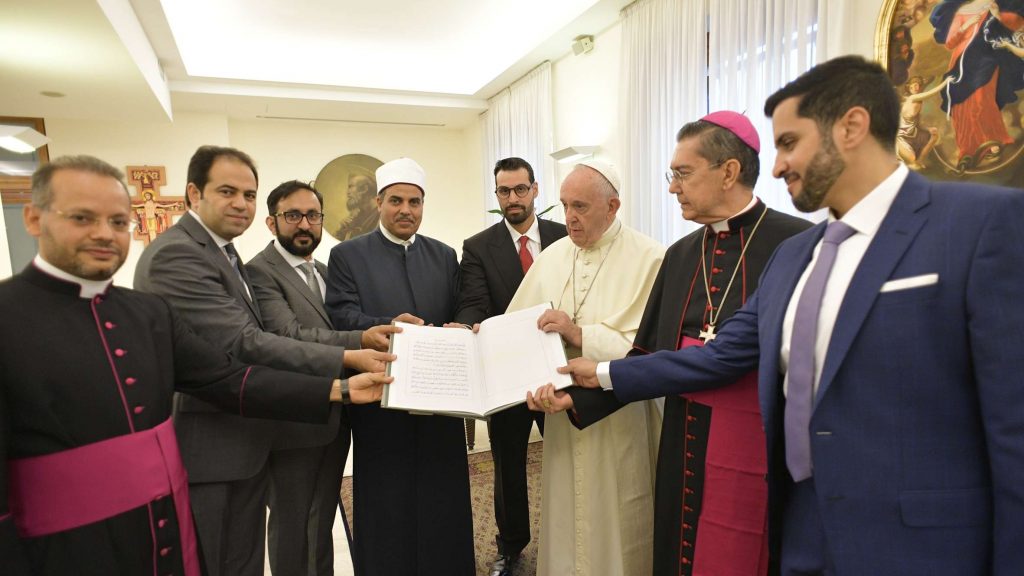This week’s interreligious day of prayer is the first major worldwide initiative of a committee created by the United Arab Emirates following Pope Francis’ trip to Abu Dhabi in 2019.
The Higher Committee of Human Fraternity is currently comprised of nine members: five Muslims; one Jew, a rabbi; two Catholics, members of the Roman Curia; and one United Nations official with no stated religion in her biography.
“As I understood, after its constitution it was thought mainly as a body related to the initiative of the ‘Abrahamic House’ in Abu Dhabi, a project launched on the occasion of the visit of Pope Francis,” Bishop Paul Hinder, Vicar Apostolic of Southern Arabia, told CNA May 14.
The Abrahamic Family House will be an interreligious complex in Abu Dhabi designed by David Adjaye to house a church, a synagogue, and a mosque on the same foundation. The committee states that it envisions the Abrahamic Family House as a place of dialogue and coexistence among religions when it is completed in 2022.
In May, the Higher Committee sent out an appeal for a worldwide day of prayer for humanity on May 14 as the world faces the coronavirus pandemic in Italian, English, French, German, Spanish, Arabic, Pashto, Malay, Persian, Swahili, Turkish, Urdu, Chinese, and Hebrew.
The committee unveiled a website, Youtube video, and hashtag for the interreligious prayer day, and paid to promote posts on Twitter advertising the initiative.
Partners supporting the committee’s “Pray for Humanity” campaign include the Vatican, Muslim Council of Elders, al-Azhar Mosque, the UAE Ministry of Tolerance, World Council of Churches, and the U.N. Alliance of Civilizations, according to their website.
The Higher Committee “has been highly promoted by the ruler of Abu Dhabi,” Hinder said.
“Actually Abu Dhabi has the intention to promote religious tolerance beyond the year of tolerance, which finished in 2019,” he added.
Mohammed bin Zayed Al Nahyan, Crown Prince of Abu Dhabi, presented the committee as a group to implement initiatives that foster tolerance and coexistence.
The committee’s primary focus is the promotion of the message of the Human Fraternity Document signed by Pope Francis and Ahmed el-Tayeb, grand imam of al-Azhar, in February 2019.
The director Holy See Press Office, Matteo Bruni, said that Pope Francis “was pleased to learn of the initiative.”
Bruni said that the pope thanked the UAE for “the concrete commitment shown on behalf of human fraternity” and expressed “the hope that similar initiatives can spring up throughout the world.”
Since its formation, the committee has met twice at the Vatican and once at the United Nations headquarters in New York.
The committee’s first meeting took place Sept. 11 at the pope’s residence in Casa Santa Marta in Vatican City. “The date was chosen as a sign of the will to build life and fraternity where others sowed death and destruction,” according to a Holy See statement.
During this meeting the group appointed Cardinal Miguel Angel Ayuso Giuxot, President of the Pontifical Council for Interreligious Dialogue, as president of the committee, and Mohamed Mahmoud Abdel Salam, former advisor to the Grand Imam of al-Azhar, as secretary.
Among the committee’s Muslim members are Secretary-General of the Muslim Council of Elders Sultan Faisal Al Remeithi, President of Al-Azhar University Mohamed Hussein Mahrasawi, Higher Council of Muslims member Yasser Hareb, and Chairman of Abu Dhabi’s Department of Culture and Tourism Mohamed Khalifa Al Mubarak.
Msgr. Yoannis Lahzi Gaid, a Coptic Catholic priest and Pope Francis’ personal secretary, is a member of the executive office of the committee, along with Sultan Al Remeithi and Yasser Hareb.
The committee added M. Bruce Lustig, rabbi of the Washington Hebrew Congregation as a member in September, and later also added Irina Bokova, former director-general of UNESCO.
“The prayer for humanity is just one stage. We want to support this document because it becomes even more relevant now after the COVID-19 pandemic,” Bokova said in an online press conference May 11.
During their meeting with UN Secretary General Antonio Guterres the committee proposed that Feb. 4 be declared the “World Day of Human Fraternity” and asked the United Nations, along with the Holy See and al-Azhar Mosque, to create a “World Summit On Human Fraternity.”
Feb. 4 marks the date that Pope Francis and el-Tayeb signed the Document on Human Fraternity during the pope’s apostolic journey to the UAE.
Bishop Hinder told CNA that Pope Francis is held in high esteem by Muslims in the region since his visit.
“I see the fruits of Pope Francis’s visit primarily in an improvement of the climate in the relationship. The interest of knowing each other better and to be in touch with one another has grown. The non-Muslim religious communities have experienced a growing recognition by the governments, who are keen to guarantee our security,” he said.
“Right now, of course, we are in an extraordinary situation of the pandemic, which has led to a standstill of the public worship for all (including the Muslims). However, I am expecting that step by step we shall get back (or forward) to a certain normality,” he added.

